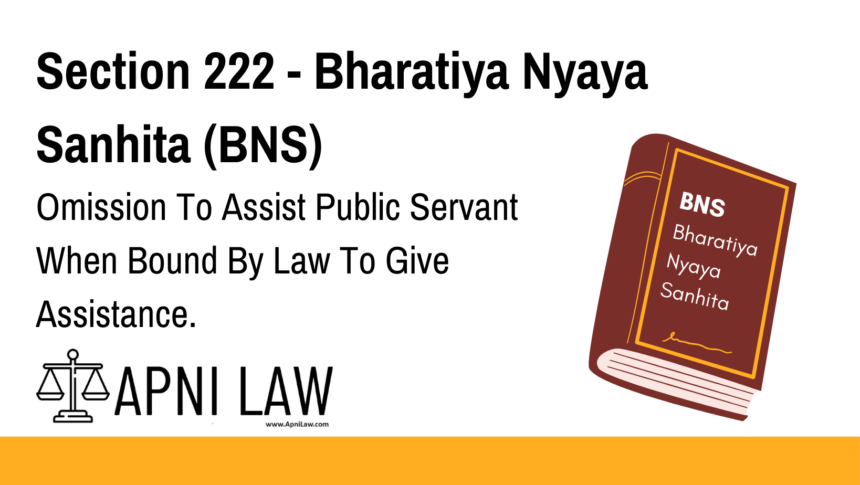Code: Section 222 BNS
Whoever, being bound by law to render or furnish assistance to any public
servant in the execution of his public duty, intentionally omits to give such assistance,––
(a) shall be punished with simple imprisonment for a term which may extend
to one month, or with fine which may extend to two thousand and five hundred
rupees, or with both;
(b) and where such assistance be demanded of him by a public servant legally
competent to make such demand for the purposes of executing any process lawfully
issued by a Court or of preventing the commission of an offence, or suppressing a
riot, or affray, or of apprehending a person charged with or guilty of an offence, or
of having escaped from lawful custody, shall be punished with simple imprisonment
for a term which may extend to six months, or with fine which may extend to five
thousand rupees, or with both.
Explanation of Section 222 BNS
Section 222 of the Bharatiya Nyaya Sanhita, 2023 (BNS) penalizes individuals who fail to assist public servants when legally required to do so. This provision ensures that citizens fulfill their legal duty in aiding public officials when necessary.
Key Aspects of Section 222 BNS
- Legal Obligation: The person must be legally bound to assist the public servant, such as in cases of emergencies or law enforcement operations.
- Intentional Omission: The failure to assist must be deliberate and without valid justification.
- Punishment:
- Imprisonment for up to one month,
- A fine of up to ₹1,000, or
- Both imprisonment and fine in certain cases.
This provision ensures that public servants receive necessary support from citizens when performing their duties.
Illustration
Example 1: Ignoring Police Calls for Help
A police officer is chasing a criminal and asks a passerby to stop the suspect. The person refuses to help despite being in a position to do so. This act is punishable under Section 222 BNS.
Example 2: Refusing to Assist in Firefighting Efforts
A firefighter requests assistance from nearby individuals to move people out of a burning building. If a person refuses to help despite being capable, they may be prosecuted under this section.
Example 3: Not Helping a Public Health Officer During a Pandemic
During a health emergency, a medical officer requests help in controlling a contagious outbreak. If a person legally required to assist refuses without justification, it could be considered an offense under Section 222 BNS.
Common Questions and Answers on Section 222 BNS
1. Who is legally bound to assist a public servant under Section 222 BNS?
Any individual who has a legal obligation (as per laws or government orders) to assist a public servant in executing their duty.
2. What is the penalty for failing to assist a public servant?
The punishment includes imprisonment for up to one month, a fine of up to ₹1,000, or both.
3. What if someone is unable to assist due to a valid reason?
If a person has a genuine and reasonable excuse, they may not be held liable under this section. The omission must be intentional to qualify as an offense.
4. Is this a bailable offense?
Yes, since the maximum punishment is one month of imprisonment, it is generally considered a bailable offense.
Conclusion
Section 222 BNS ensures that citizens fulfill their legal duty in assisting public servants when required. This provision supports law enforcement, emergency services, and other public functions by ensuring cooperation.
For expert legal insights, visit ApniLaw today! 🚀










